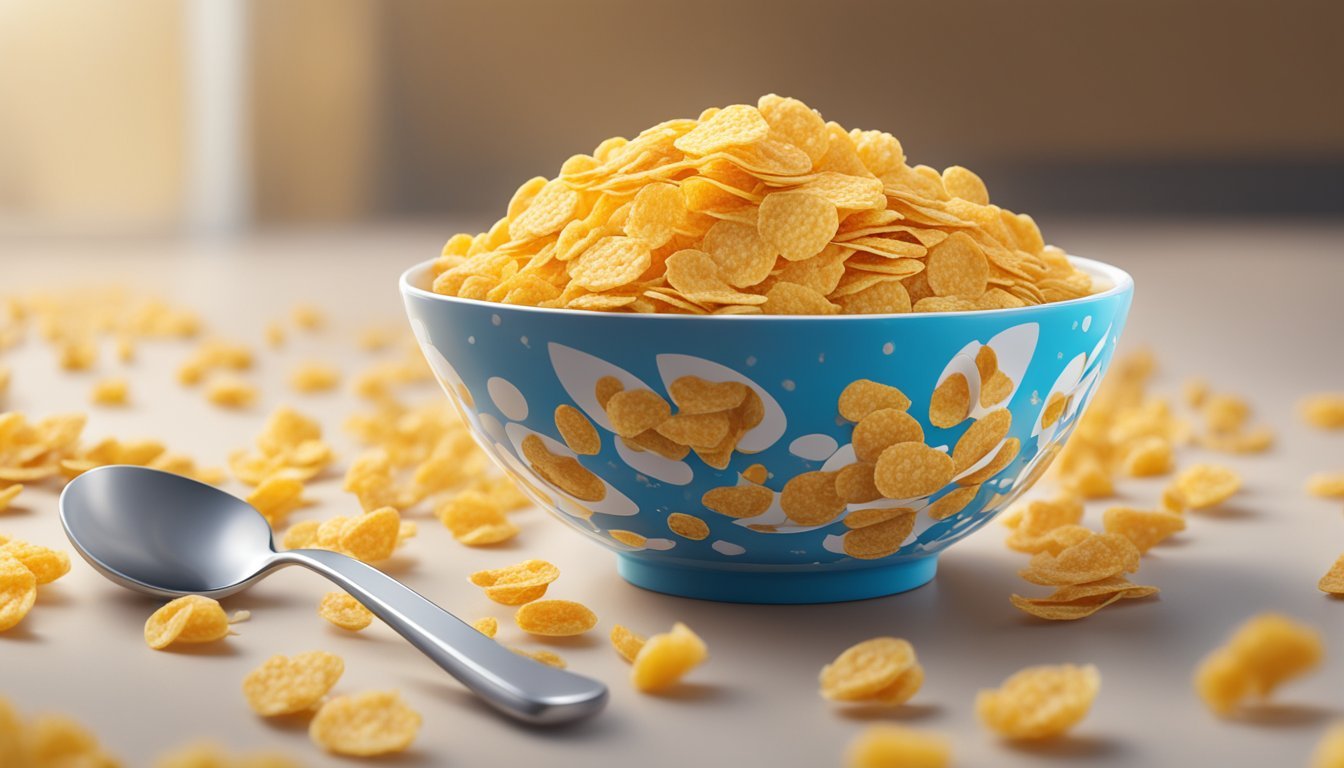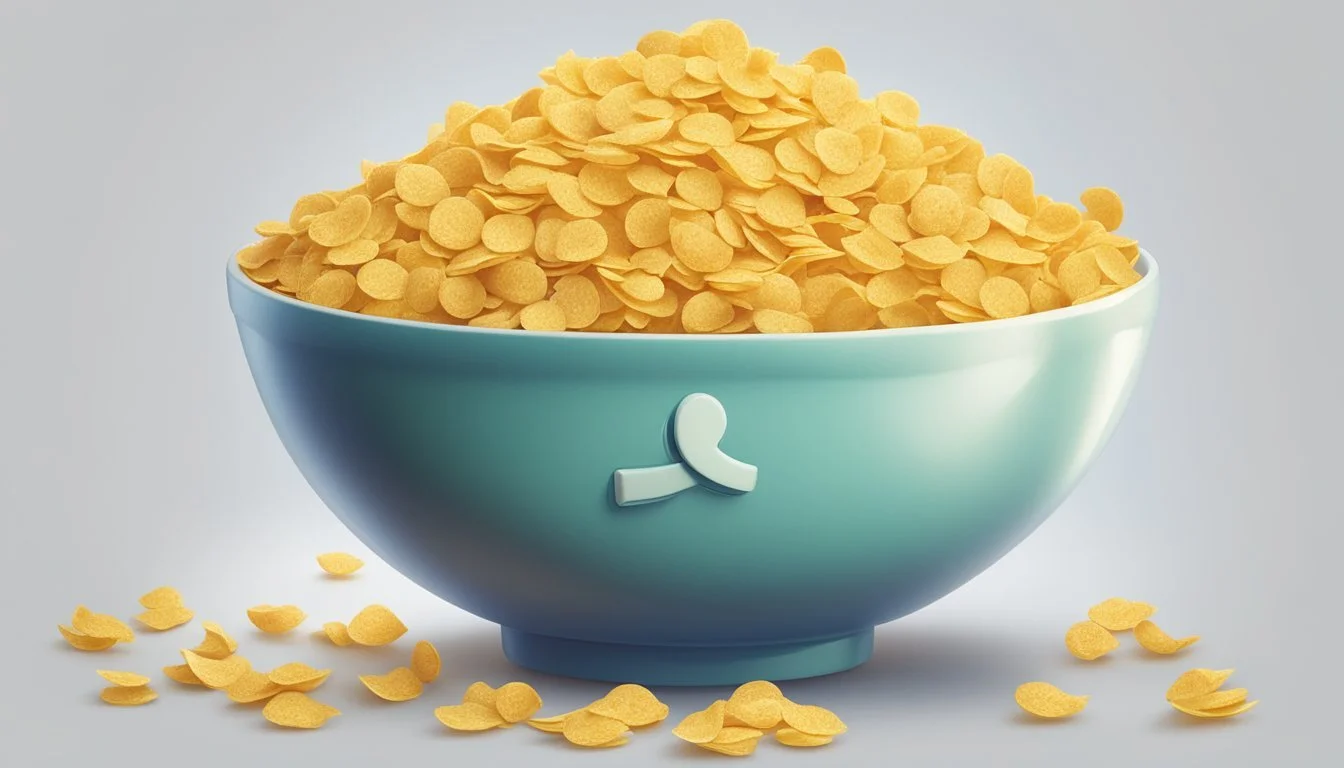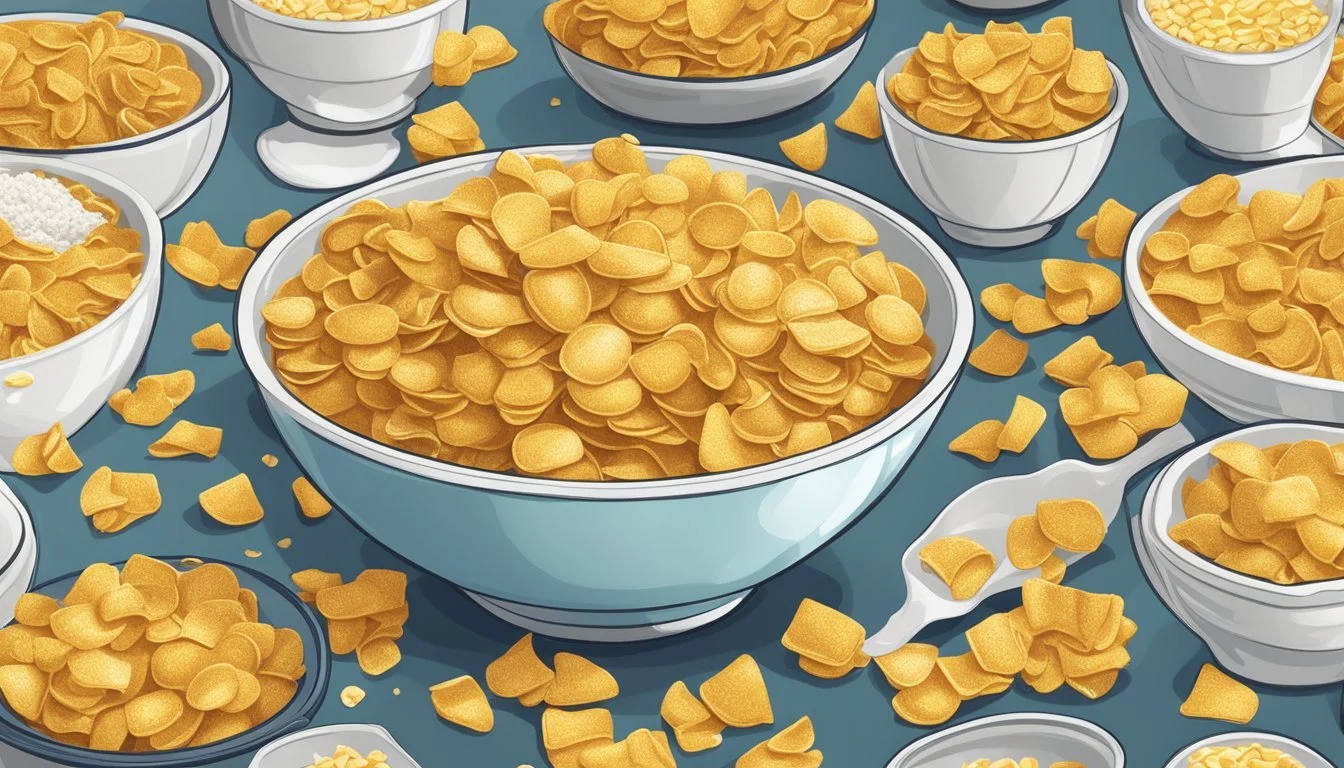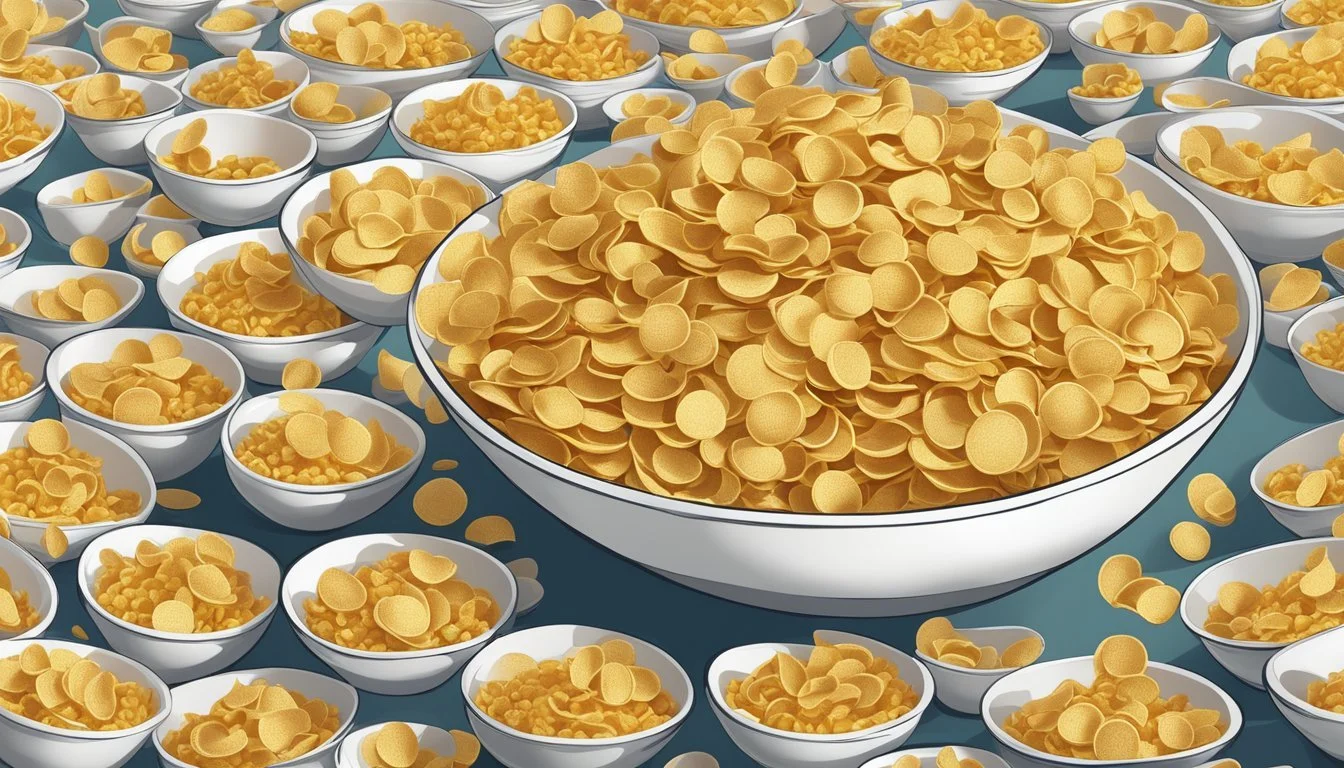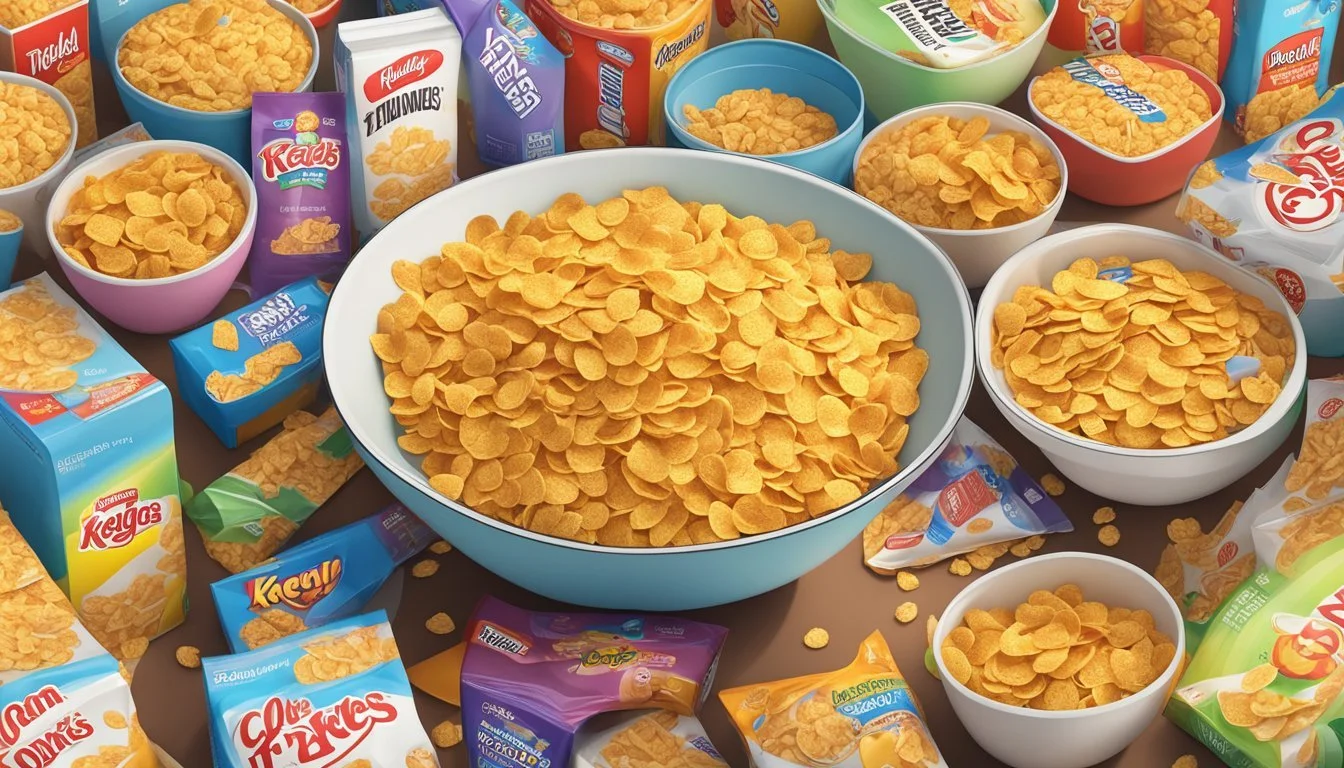How Many Servings of Kellogg's Corn Flakes Per Day Is Too Much?
Understanding Dietary Limits
Determining how many servings of Kellogg's Corn Flakes one should consume daily involves considering nutritional guidelines and individual dietary needs. Kellogg's Corn Flakes are a popular breakfast cereal known for their crisp texture and mild flavor, made primarily from milled corn. A standard serving size, according to the cereal's packaging, is typically around 1 1/2 cups or 42 grams, which provides 150 calories without milk. When milk is added, the calorie content increases, and the overall nutritional profile changes, offering additional protein and calcium.
The consumption of Kellogg's Corn Flakes should align with the broader context of a balanced diet and daily caloric intake. The nutritional makeup of Corn Flakes includes carbohydrates, with modest amounts of protein and minimal fat. Nutritional values can vary slightly depending on specific product formulations, but they typically contain essential vitamins and minerals such as iron and some B-vitamins. It's critical to note that while Corn Flakes can be part of a healthy diet, moderation is vital. Excessive intake may lead to an imbalance, particularly with respect to sugar and overall caloric consumption.
Health experts often emphasize the importance of variety in one's diet to ensure a full range of nutrients. Therefore, while Kellogg's Corn Flakes can serve as a convenient and quick breakfast option or snack, they should not be the sole component of one's dietary intake. When considering how many servings to consume, individuals should also factor in their level of physical activity, overall health goals, and any specific dietary restrictions or needs.
Nutritional Profile Of Kellogg's Corn Flakes
Kellogg's Corn Flakes cereal is a staple breakfast choice for many, known for its simple ingredients and crisp texture. To understand its impact on diet, it's important to analyze its macronutrients and micronutrients, the serving size in relation to the daily value, and the nutritional pros and cons.
Macronutrients
Kellogg's Corn Flakes primarily consists of carbohydrates, with a 1 1/2 cup serving (42 grams) containing 150 calories and 0 grams of fat. The same serving has a notable amount of protein at roughly 3.36 grams and sugar at 4 grams, providing quick energy. However, the cereal has minimal fiber, impacts the glycemic index and satiety levels.
Micronutrients
The cereal is enriched with a variety of vitamins and minerals. This includes iron and B-vitamins like thiamin (vitamin B1), riboflavin (vitamin B2), niacin (vitamin B3), vitamin B6, and vitamin B12. It also contains a small amount of vitamin D, folate, vitamin C, and vitamin A for added nutritional value.
Serving Size And % Daily Value
The mentioned serving size of 1 1/2 cups (42 grams) is crucial for measuring nutritional intake. Each serving provides a percentage of the recommended daily value (DV) for adults, with the packaging typically suggesting a 2,000 calorie daily diet as a reference. Sodium content checks in at around 300 mg per serving, contributing to the DV of this nutrient.
Nutrient Amount per serving % Daily Value* Calories 150 Total Fat 0g 0% Sodium 300mg 13% Total Carbohydrates 35g 13% Sugars 4g Protein 3.36g Iron High Vitamin D Low Vitamin C Enriched Folate Enriched
*% Daily value are based on a 2,000 calorie diet.
Nutritional Advantages And Concerns
Advantages: Kellogg’s Corn Flakes are fat-free and offer a low-fat start to the day. They are also enriched with iron and B-vitamins, aiding in energy metabolism and red blood cell formation.
Concerns: A low fiber content could mean less satiety, potentially leading to overconsumption. The simple carbohydrates mostly contribute to quick energy, which could be a concern for those monitoring blood sugar levels. Additionally, while it has no cholesterol or saturated fats, the added sugars and moderate sodium level may be a concern for some health-conscious consumers.
Consumption Guidelines
When considering how many servings of Kellogg’s Corn Flakes to consume per day, it is important to assess the cereal’s nutritional content in the context of an individual’s overall dietary needs and health goals.
Recommended Daily Intake
The standard serving size for Kellogg's Corn Flakes is 1 1/2 cups (42g), which contains approximately 150 calories, 4g of sugar, and 300mg of sodium. This represents about 29 servings per container. It's recommended that one follows the serving size guidance provided on the packaging to align with their daily caloric intake needs which, for an average adult, the Daily Value (DV) is based on a 2,000 calorie diet.
Calories: 150 per serving
Sugar: 4g per serving
Sodium: 300mg per serving
Servings per Container: About 29
Factors Influencing Consumption
An individual's age, activity level, and health status are significant factors in determining the appropriate consumption amount. For instance, a physically active adult may require more calories and therefore might consume additional servings. However, one should consider the sugar and sodium content, especially for those monitoring blood pressure or blood glucose levels.
Age: Younger individuals may require different caloric intake than adults.
Activity Level: High levels of physical activity can necessitate increased caloric consumption.
Health Status: Conditions such as diabetes or hypertension may influence dietary restrictions, particularly concerning sugar and sodium.
Potential Health Risks Of Overconsumption
Excessive intake of Kellogg's Corn Flakes can lead to an increased risk of obesity, diabetes, and cardiovascular disease, mainly due to high levels of sugar and carbs contributing to the overall calorie and glycemic index of a diet. Additionally, negligible amounts of dietary fiber, cholesterol, and fatty acids provide limited cardiovascular benefits and might affect weight management.
Obesity: High-calorie diets can contribute to weight gain.
Diabetes: Diets high in sugar and net carbs can affect glucose control.
Cardiovascular Disease: Lack of dietary fiber may lead to heart health issues.
Balanced Diet Inclusion
Corn Flakes can be part of a balanced diet when consumed in moderation, considering the % Daily Value for various nutrients. It's low in saturated fat and cholesterol, but it lacks significant amounts of dietary fiber. One should balance their cereals with high-fiber foods and those containing essential fatty acids to ensure a well-rounded diet.
% Daily Value: Use this as a guide for managing nutrient consumption.
Dietary Fiber: Supplement Corn Flakes with high-fiber foods.
Fatty Acids: Include foods high in essential fatty acids for a balanced intake.
Allergen And Sensitivity Information
When considering Kellogg's Corn Flakes, individuals with food allergies or sensitivities need to evaluate the allergen information carefully. Labels and packaging should be scrutinized to ensure dietary safety.
Declaration Of Obligatory Allergens
Kellogg's Corn Flakes cereal appears to be free from many common allergens. The product does not contain milk, soy, eggs, wheat, peanuts, fish, crustacean shellfish, tree nuts, or sesame. It’s essential for consumers with allergies to verify that this information still applies by checking the latest product package or the SmartLabel.
Cross-Contamination Risks
While the product itself may be free from certain allergens, the potential for cross-contamination cannot be ignored if it is produced in a facility that handles other allergenic products. Consumers should look for statements on the package that outline any risk of allergen cross-contamination.
Substitutes And Alternatives
For individuals who are sensitive or allergic to any residual allergens that could be present in Kellogg's Corn Flakes or those looking for alternatives due to dietary restrictions, here are some options:
Gluten-Free Corn Flakes for those avoiding gluten.
Lactose-Free and Nut-Free cereals for individuals avoiding lactose and nuts.
Labeling And Consumer Awareness
Kellogg's ensures that the ingredients and allergen statements are available on their branded site via SmartLabel, making it easier for consumers to access detailed product information. The SmartLabel provides a UPC code, ingredients list, and allergen information, allowing for informed choices. Consumers should always review the label for the most current information before consumption.
Product Information And Packaging
When selecting Kellogg's Corn Flakes, understanding nutrition facts, the brand's heritage, and its commitment to sustainability are key. These help consumers make informed decisions about their daily cereal intake.
Understanding Food Labels
Kellogg's Corn Flakes cereal provides consumers with transparent food labels through SmartLabel™. Each 43 oz box contains the following nutrition facts for a 1 1/2 cup (42 g) serving size:
Calories: 150
Saturated Fat: 0g
Sodium: 300mg
Sugars: 4g
Consumers are encouraged to check the SmartLabel for the % Daily Value, which indicates how much a nutrient in a serving of food contributes to a daily diet.
Kellogg's Brand History And Values
Founded by W.K. Kellogg, the company's values are rooted in providing nutritious and delicious breakfast options. Kellogg's Corn Flakes, originated in Battle Creek, MI 49016, continues this legacy, ensuring its cereal is not only a tasty breakfast choice but also fortified with vitamins and minerals, aiding a nutritious start to the day.
Packaging And Sustainability
Kellogg is dedicated to sustainability, consistently exploring packaging innovations to reduce environmental impact. The product package of Kellogg's Corn Flakes is designed to maintain freshness while being mindful of the materials used. Single serve cereal bowls and larger boxes are part of the product range, catering to both convenience and family-size needs. Consumers should refer to the branded site or package for information on recycling and package disposal.
The company strives to balance convenience and their commitment to the environment, aligning with their values and goals in sustainability.
Supplementary Health Topics
This section explores the interface between Kellogg’s Corn Flakes consumption and broader health considerations, particularly as they pertain to maintaining wellness and addressing specific health issues.
Diet And Lifestyle For Wellness
Incorporating Kellogg's Corn Flakes within a balanced diet is essential for overall wellness. They contain approximately 100 calories per 1 cup serving, and are low in fat, and sugars, making them a moderate choice for breakfast when health and weight management are considerations.
Activity Level: Physical activity should complement dietary choices to maintain a healthy weight.
Nutrition: Corn Flakes provide basic nutrients, but one should also include fruits, vegetables, lean proteins, and whole grains for nutritional completeness.
Glycemic Index: As Corn Flakes have a higher glycemic index, moderate consumption is advised, especially for individuals with diabetes.
Managing Specific Health Conditions
The management of health conditions such as obesity, diabetes, and cardiovascular disease requires particular attention to diet.
Weight and Obesity: Monitoring portions helps prevent excess calorie intake, which can contribute to obesity.
Health Condition Dietary Consideration Diabetes Monitor carbohydrate intake and sugar levels in Corn Flakes. Cardiovascular Disease Consider the sodium content for blood pressure management.
Allergens: Individuals with sensitivities should be aware that Corn Flakes can contain allergenic additives and flavor enhancers.
Balanced Diet: For those with health conditions, it's critical to balance Corn Flakes intake with other nutrient-rich foods to ensure dietary adequacy.
Conclusion
When assessing the appropriate daily servings of Kellogg's Corn Flakes, one must consider their nutritional profile and overall dietary requirements. A single serving, which is typically about 1 cup or 28 grams, contains roughly 100 calories, 0 grams of fat, 200 milligrams of sodium, 24 grams of carbohydrates, 3 grams of sugars, and 2 grams of protein.
Recommended Intake
Calories: Adults should aim for a daily caloric intake between 2,000 to 2,500, depending on age, sex, and level of physical activity.
Sodium: The American Heart Association recommends no more than 2,300 milligrams per day for adults, moving toward an ideal limit of no more than 1,500 milligrams per day.
Sugars: The Dietary Guidelines for Americans suggest limiting added sugars to less than 10% of daily calories.
Considering these guidelines:
Adults may consume several servings of Corn Flakes as part of a balanced diet, provided the intake of calories, sugars, and sodium remains within recommended daily limits.
It is crucial to balance Corn Flakes consumption with other nutrient-dense foods to ensure adequate intake of dietary fiber, protein, vitamins, and minerals.
Health Considerations
Individuals need to bear in mind that:
Exceeding the recommended serving size may lead to excessive intake of sugars and sodium.
People with specific dietary restrictions, such as low-sodium diets or diabetes, should be more cautious.
In summary, while Kellogg's Corn Flakes can be part of a healthy diet, moderation is key, as with any food product. Consumers are advised to not only monitor serving sizes but also complement their cereal with other nutritious foods to achieve a well-rounded diet.

